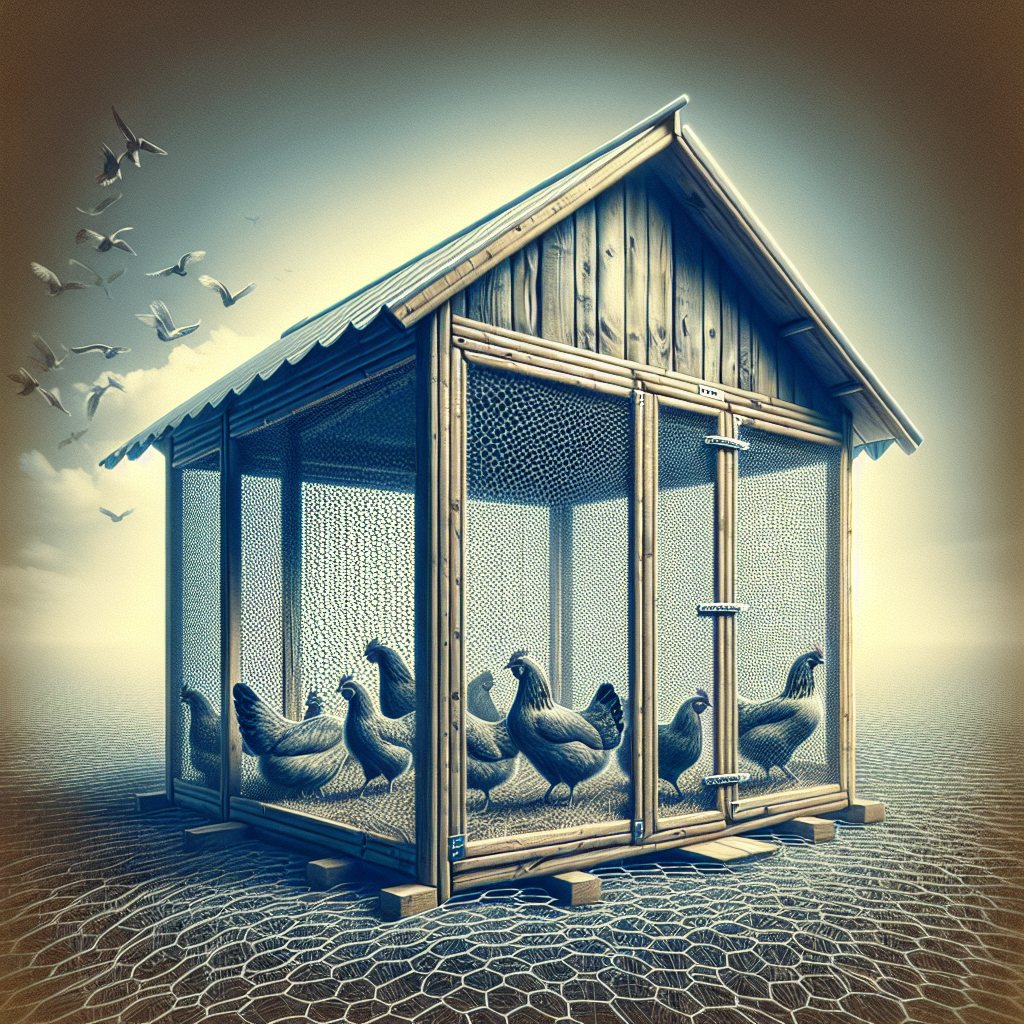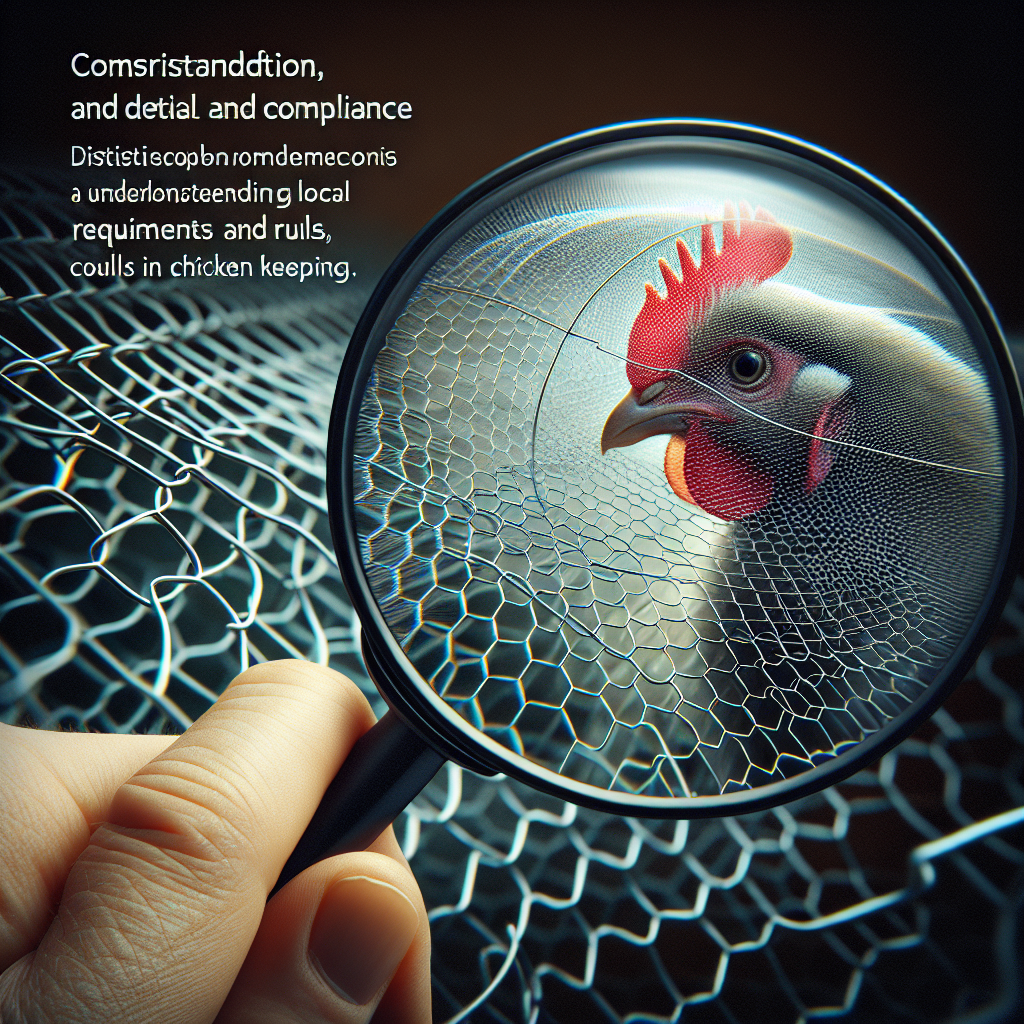If you have recently joined the exciting world of chicken keeping, ensuring the safety of your beloved flock is undoubtedly a top priority. You may find yourself wondering, how can new chicken keepers protect their feathery friends from cunning predators? With a little knowledge and some easy-to-implement measures, you can provide a safe and secure environment for your chickens, allowing them to live happily and stress-free. In this article, we will explore some practical tips and strategies that will help keep your flock safe from potential threats. So, let’s get started and dive into the world of chicken predator protection together!
Choosing the Right Chicken Coop
Consider the Size and Design
When it comes to choosing a chicken coop, it’s essential to consider the size and design that will best suit your flock’s needs. The coop should provide enough space for your chickens to move around comfortably and engage in their natural behaviors. The general rule of thumb is to allow at least 4 square feet of coop space per chicken. Additionally, consider the design of the coop in terms of ventilation and accessibility. Proper ventilation is vital to maintain a healthy environment for your chickens, while easy access for cleaning and egg collection will make your life as a chicken keeper much easier.
Ensure Secure and Sturdy Construction
To keep your chickens safe from predators, it’s crucial to choose a coop with secure and sturdy construction. The coop should be made of materials that can withstand attempts by predators to break in. Look for coops with strong doors and windows that can be securely closed and locked. Reinforced wire mesh should be used to prevent predators from reaching your chickens. Additionally, ensure that the coop is well-built and doesn’t have any gaps or weak spots where predators could gain access.
Predator-Proof the Coop Entrance
One of the most vulnerable areas of a chicken coop is the entrance. Predators such as raccoons, foxes, and even snakes are adept at finding their way into coops through small openings. To prevent this, install a predator-proof entrance. This can be achieved by adding a secure door with a sturdy lock. Consider using a metal door, as it is more difficult for predators to damage or break through. Remember to check the entrance regularly for any signs of wear or damage and make necessary repairs to keep your chickens safe.
Implementing Secure Fencing
Determine the Ideal Perimeter Size
When it comes to protecting your chickens from predators, having a secure perimeter is essential. Determine the ideal perimeter size based on the number of chickens you have and the space you have available. It’s important to provide enough space for the chickens to roam comfortably without allowing predators to get too close. Keep in mind that some predators, like raccoons, can reach far with their paws, so it’s better to err on the side of caution and make the perimeter slightly larger than you think is necessary.
Select Suitable Fencing Material
Choosing the right fencing material is crucial for keeping predators at bay. Opt for sturdy materials like welded wire, chain-link, or hardware cloth with small openings. These materials will prevent predators from squeezing through or reaching in with their paws. Avoid materials like chicken wire, which can easily be torn or stretched by determined predators. Remember to check the fence periodically for any signs of damage and repair it promptly.
Dig Underground Barriers to Deter Burrowing Predators
Some predators, such as raccoons, skunks, and foxes, are skilled at digging under fences to access your chickens. To deter these burrowing predators, consider digging underground barriers. This can be done by burying hardware cloth or chicken wire around the perimeter of the fence, extending it several inches below the ground surface. This will make it difficult for predators to dig under and gain access to your flock. Regularly inspect the barriers for any signs of damage or shifts and make any needed repairs.
Installing Proper Lighting
Illuminating the Coop and Surroundings
Having proper lighting around your chicken coop can be a deterrent to predators. Install lights that illuminate both the coop and the immediate surroundings. Predators are less likely to approach a well-lit area, as it increases the chances of them being detected. Motion-activated lights are particularly effective, as they provide added security by turning on when any movement is detected.
Use Motion Sensor Lights for Added Security
To enhance the security of your coop even further, consider installing motion sensor lights. These lights will automatically turn on when they detect any movement in the area, drawing attention to potential predators. With the sudden visibility, predators are more likely to be startled and deterred from approaching your chickens. Motion sensor lights are energy-efficient and can be easily installed by following the manufacturer’s instructions.
Utilizing Alarm Systems and Deterrents
Install Predator Alarms
Predator alarms are excellent tools for keeping your chickens safe from potential threats. These alarms emit loud sounds or flashing lights when triggered, scaring away predators and alerting you to their presence. There are various types of predator alarms available, ranging from simple devices to more advanced systems that can be connected to your smartphone. Choose one that suits your needs and budget to provide an extra layer of protection for your flock.
Implement Visual Deterrents
Visual deterrents can help deter predators from approaching your coop. Consider installing scarecrows, reflective surfaces, or hanging objects that move with the wind, such as tin foil strips or CDs. These visual deterrents create the illusion of a human presence or unfamiliar objects, which can intimidate predators and discourage them from targeting your chickens. It’s important to periodically change the location or type of visual deterrents to prevent predators from becoming accustomed to them.
Utilize Auditory Deterrents
Auditory deterrents can also be effective in deterring predators. Use devices that emit distress calls or predator sounds to create the impression that your flock is aware of potential danger. Predators rely on the element of surprise, and hearing these sounds can make them think twice before approaching. Remember to adjust the volume and location of these deterrents regularly to prevent predators from becoming desensitized to the noises.
Creating an Outdoor Run
Construct a Safe Outdoor Run
Providing your chickens with an outdoor run where they can safely graze and stretch their wings is important for their physical and mental well-being. When constructing the run, ensure that it is securely fenced on all sides, including the top, to prevent predators from gaining access. Use the same sturdy materials mentioned earlier, such as welded wire or hardware cloth, and ensure that the fencing is properly reinforced. Regularly inspect the run for any signs of damage or weakness and repair as needed.
Cover the Run with Netting or Wire Mesh
To add an extra layer of security to your chicken run, consider covering it with netting or wire mesh. This will prevent birds of prey, such as hawks or eagles, from swooping down and carrying off your chickens. Ensure that the netting or mesh is securely fastened and doesn’t have any gaps that could allow predators to enter. Keep in mind that the netting should be strong enough to support the weight of a predator that might attempt to land on it.
Securing Chicken Feed and Water
Use Secure Storage Containers for Feed
To prevent attracting predators to your coop, it’s important to store chicken feed in secure containers. Predators are often enticed by the smell of food and will go to great lengths to access it. Choose containers that are airtight and made of sturdy materials, such as metal or heavy-duty plastic. This will not only keep the feed fresh but also prevent predators from gnawing through the containers. Store the feed in a secure location, away from the coop, to minimize the risk of predators associating the smell of food with your chickens.
Elevate Chicken Water Sources
Water is vital for the health of your chickens, but it can also attract predators. To minimize the risk, elevate your chicken water sources off the ground. This can be done by using water containers with built-in stands or by placing the water containers on secure platforms. Elevating the water sources will make it more difficult for predators to access them and reduce the chances of them lingering near your coop.
Implementing Predatory Animal Traps
Set up Traps for Specific Predators
In some cases, setting up traps can be an effective way to catch specific predators that pose a threat to your flock. Research the types of predators in your area and determine the appropriate traps to use. Live traps can be used for predators that you’d like to catch and relocate, while lethal traps are an option for predators that can’t be safely released elsewhere. Be sure to check local regulations regarding trapping and disposal of captured animals to ensure you are acting within the law.
Dispose of Captured Animals Humanely
When using traps to catch predators, it’s important to dispose of captured animals humanely. If releasing the animal is not an option, follow the guidelines provided by your local wildlife or pest control agency for proper disposal. In some cases, it may be necessary to contact a professional to handle the situation. Always prioritize the safety of both your chickens and the captured animals to ensure a humane and responsible approach.
Building Predator-Proof Nesting Boxes
Secure the Nesting Boxes Inside the Coop
Predator-proofing your nesting boxes is an important step to protect your chickens and their eggs. Ensure that the boxes are securely attached to the inside of the coop, away from any potential access points. Use sturdy materials, such as solid wood or metal, for the construction of the boxes. Avoid any gaps or openings that could allow predators to reach inside. Regularly inspect the nesting boxes for any signs of damage or wear and make any necessary repairs promptly.
Use Latches and Locks to Prevent Access
To further secure the nesting boxes, use latches and locks to prevent predators from gaining access. Ensure that the latches are sturdy and in good working condition. Consider using combination locks or padlocks, as they provide an extra layer of security. Regularly check the latches and locks for any signs of wear or damage and replace them as needed.
Establishing a Predator Patrol Routine
Inspect Perimeters Regularly
Regular inspections of the perimeter of your chicken coop and run are essential to identify any signs of potential predator activity. Walk around the area and look for tracks, burrows, or any damage to the fencing or coop. Pay attention to any unusual behavior or sounds coming from inside the coop, as this could indicate the presence of a predator. By conducting regular inspections, you’ll be able to address any issues promptly and ensure the safety of your flock.
Identify Signs of Predator Activity
Learning to recognize signs of predator activity is crucial for keeping your chickens safe. Look for droppings, feathers, or fur near the coop or run, as these can be indicators of predators. Keep an eye out for changes in your chickens’ behavior, such as nervousness or a decrease in egg production, as these could be signs that predators are lurking nearby. Educate yourself on the common predators in your area and familiarize yourself with their preferred hunting methods and signs of their presence.
Adopting Companion Animals as Guardians
Consider Dogs as Guardians
Dogs can be excellent companions and effective guardians for your flock. Some dog breeds are known for their protective instincts and will fiercely defend their feathered friends. Research dog breeds that are known to be good with chickens and consider adopting one to join your family. Introduce the dog to the chickens gradually, using positive reinforcement training techniques. With proper training and supervision, a well-trained dog can help deter predators and provide an extra layer of protection for your flock.
Utilize Birds of Prey to Deter Predators
Using birds of prey as guardians may seem counterintuitive, but it can be an effective way to deter predators. Owls, hawks, and falcons are natural predators of smaller animals, including the ones that could threaten your chickens. By encouraging the presence of these birds in your area, you can create a natural deterrent for potential predators. Install perches or nesting boxes specifically designed for raptors to attract them to your property. However, ensure that the birds of prey do not pose a direct threat to your flock, as they can also be predators of chickens in some situations.
By following these comprehensive steps, new chicken keepers can ensure the safety of their flock from predators. From choosing the right coop and implementing secure fencing to utilizing lighting, alarms, and deterrents, every aspect of flock protection is covered. By creating a secure environment, regularly inspecting the premises, and considering the use of companion animals as guardians, your chickens can thrive and remain safe from the ever-present threat of predators. Remember that each step is crucial, and a combination of multiple strategies will provide the best defense for your beloved chickens.




